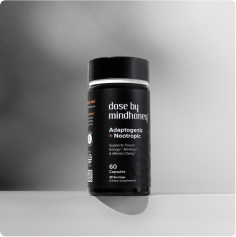Unlocking Mental Energy: The Role of ATP in Cognitive Function

Unlocking Mental Energy: The Role of ATP in Cognitive Function
In the intricate dance of biological processes within the human body, one molecule takes center stage as a vital player in sustaining life and powering cognitive functions: Adenosine Triphosphate, or ATP. Often referred to as the "energy currency" of cells, ATP is not only a fundamental component for physical activities but also a key factor in maintaining optimal cognitive function.
ATP: The Cellular Energy Currency
Adenosine Triphosphate is a nucleotide, a molecule consisting of a nitrogenous base (adenine), a sugar (ribose), and three phosphate groups. The energy stored in the chemical bonds between these phosphate groups is what makes ATP unique and crucial for cellular activities.
When a cell requires energy, ATP undergoes hydrolysis, a process where it loses one of its phosphate groups, resulting in the release of energy. This energy release fuels various cellular functions, including muscle contraction, DNA synthesis, and, significantly, the intricate processes of the brain.
ATP and Cognitive Function
The brain, despite constituting only about 2% of the body's weight, consumes a staggering 20% of the body's total energy. This high energy demand is necessary for maintaining the electrochemical gradients across neurons, synthesizing neurotransmitters, and supporting overall cognitive activities.
-
Neurotransmitter Synthesis and Release: Neurotransmitters are the chemical messengers that transmit signals between neurons, allowing communication within the nervous system. The synthesis and release of neurotransmitters, such as dopamine, serotonin, and acetylcholine, depend on adequate ATP levels. These neurotransmitters play a crucial role in regulating mood, attention, and memory.
-
Maintaining Resting Membrane Potential: Neurons, the building blocks of the nervous system, rely on the maintenance of a resting membrane potential for proper communication. This requires energy to pump ions across the cell membrane. ATP-powered ion pumps, such as the sodium-potassium pump, are essential for establishing and maintaining this resting potential, allowing neurons to fire and transmit signals.
-
Protein Synthesis for Memory Formation: The formation of memories involves the synthesis of new proteins. ATP provides the energy needed for transcription and translation processes, allowing the conversion of genetic information into functional proteins crucial for memory consolidation.
-
Neuronal Signaling: Neuronal signaling is a complex process that involves the transmission of electrical signals along the length of a neuron and the release of neurotransmitters at synapses. These activities demand significant energy, which is supplied by ATP. The efficiency of these processes contributes to the speed and accuracy of cognitive functions.
-
Mitochondrial Function: Mitochondria, often referred to as the powerhouse of the cell, are responsible for ATP production through oxidative phosphorylation. The brain's high metabolic activity and constant demand for energy make mitochondrial function, and consequently ATP production, vital for sustaining cognitive processes.
Boosting Cognitive Function: Supporting ATP Production
Given the pivotal role of ATP in cognitive function, it becomes essential to explore ways to support its production and ensure optimal brain health. Here are some lifestyle factors that can positively influence ATP levels:
-
Nutritious Diet: Consuming a balanced diet rich in nutrients is crucial for ATP production. Nutrients such as B-vitamins, found in whole grains and leafy greens, are particularly important for the energy metabolism pathways that generate ATP.
-
Regular Exercise: Physical activity enhances mitochondrial function and promotes the production of ATP. Both aerobic and resistance exercises have been shown to positively impact cognitive function and overall brain health.
-
Adequate Sleep: Quality sleep is essential for the restoration of cellular functions, including ATP production. Chronic sleep deprivation can adversely affect cognitive performance and may contribute to a decline in ATP levels.
-
Stress Management: Chronic stress can negatively impact mitochondrial function and ATP production. Practices such as mindfulness meditation and yoga can help manage stress and support overall brain health.
-
Hydration: Dehydration can impair cognitive function and reduce ATP production. Maintaining proper hydration levels ensures optimal cellular function, supporting energy production in the brain.
CONCLUSION
In conclusion, Adenosine Triphosphate stands as a linchpin in the intricate machinery of cognitive function. Understanding its role and implementing lifestyle practices that support its production can contribute to improved mental clarity, enhanced memory, and overall cognitive well-being. As we delve deeper into the mysteries of the brain, the significance of ATP serves as a reminder that our daily choices profoundly influence the vitality of our most complex organ.



